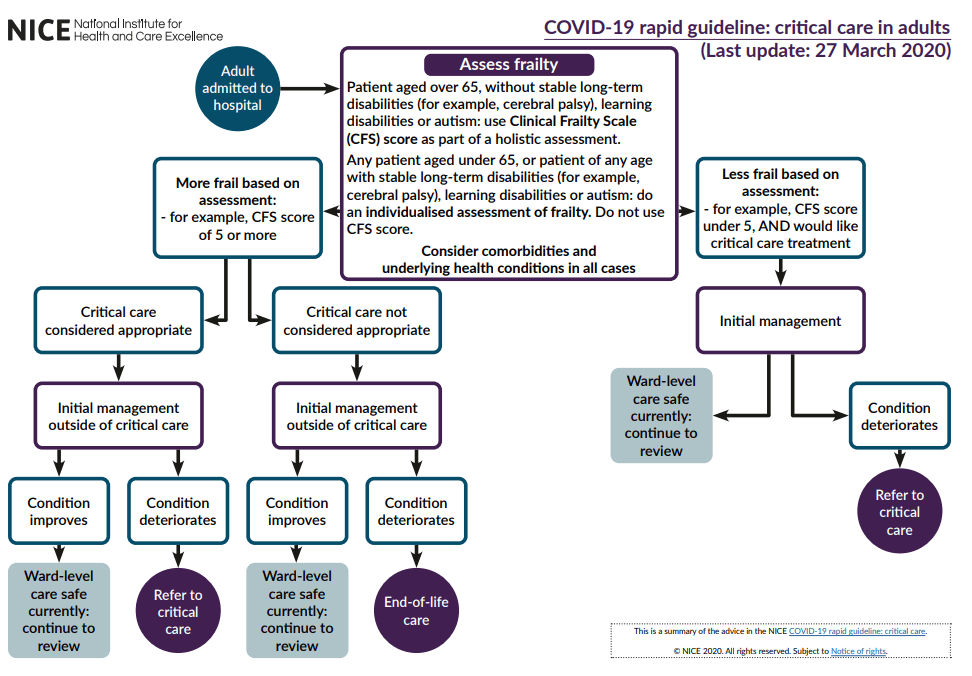COVID-19
TheSpotlight

#ItCouldBeYou
Since COVID arrived, the mainstream world should have learned one thing the Illness and Disability community has been trying to get Able society to grasp for years – It could be YOU.
However, when NICE (UK - The National Institute for Clinical Care and Excellence) issued guidelines stating people with certain medical conditions (specifically Autism) should NOT receive intensive treatment to make way for people without such conditions, we decided to not to publish the piece we had planned and had started researching.
Some of us have come
to avoid seeking emergency medical care when we need it
due to the medical gaslighting
and
Institutional Abuse
we endure.
NICE did
come under fire from a number of groups and organisations for their discriminatory and abusive treatment of certain groups, who claimed that the 'guidance' was not lawful according to certain
anti-discrimination laws made to protect vulnerable people.
Although they stated that the new 'guidelines' had been removed from their website, they remained online for a little while before finally being removed.
Instead, their website now reads:
'The CFS [Clinical Frailty Scale] should not be used in younger people,
people with stable long-term disabilities
(for example, cerebral palsy), learning disabilities or autism.'
But, the idea had already been unleashed and placed in the minds of those working in the medical field, and had there not been such a sudden and strong backlash, it is possible that the statement would not have changed.
The fact that NICE crossed the line in the first place is shocking, showing shows a deeper discrimination against and unacceptable attitude towards people living with such conditions known as Ableism.
Confusing Claims
Although NICE states that the CFS should not now be used in certain circumstances as illustrated in the above quote, the Critical Care Algorithm in a pdf. accessible via their website, as you can see in the chart below, has advice that is still confusing.
The 'Assess frailty' box at the top says that in people under 65 years-old or patients of any age with 'stable long-term disabilities, learning disabilities or autism' the CFS is not to be used, and that an individual assessment of frailty should be used instead.
But the box leading off the arrow to the left states 'More frail based on assessment: - for example, CFS score of 5 or more', which seems to contradict what is said about the scale no longer being used.
Confused?
So are we...
'Choices' Being Made
In the weeks before the virus hit the UK hard, reports were coming out of Europe claiming that doctors were being forced to 'make choices' regarding who and who would not receive treatment based on their age and medical histories, with younger and healthier patients receiving treatment as they were deemed more likely to survive or recover with a better quality of life (as defined by an Able Society).
It then emerged that in the UK (including Wales) some General Practitioners' surgeries had wrongfully sent out letters to some households asking patients to sign Do Not Resuscitate orders - something which garnered a both stunned and sickened response from the public.
Sadly, with the NHS being chronically underfunded and both beds and medical equipment in short supply, this has become a fact of life (or death) in Britain, though NICE are still stating that when it comes to critical care medical staff should:
'Sensitively discuss a possible 'do not attempt cardiopulmonary resuscitation' decision with all adults with capacity and an assessment suggestive of increased frailty (for example, a CFS score of 5 or more).'
HEDS Up, #ysuTribe!
We could dedicate pages to NICE and the pages upon pages now on their website. But what is
our advice to you now when it comes to COVID-19 and being in a body with Ehlers-Danlos Syndrome, Dysautonomia, Craniocervical Instability, Mast Cell Activation Disorder and Gastroparesis (the most commonly reported associated conditions)?
As we said on our Facebook page when we announced that we would no loner be running our planned piece -
you should be researching your conditions now
to increase your own understanding of the risks
to YOUR
body.
Think about how your body has healed in the past.
Think of how POTS (Dysautonomia), for example, affects your heart rate and rhythms, oxygen levels and blood pressure.
Think of where your care has been in normal times, and how much harder (impossible?) it would be to get that specialist care on top of COVID Care should you need it.
Think of your nutritional status.
Think about how your Mast Cells have behaved in the past.
Many of the Tribe have a combination of conditions that are not covered by research in this circumstance.
This means nobody can say for sure what the increased risks are or are not.
Though we are sure many of you CAN
see the risks.
We feel the best thing to do is use credible sources (like PubMed) to learn as much about our own bodies and COVID19 as we can so we make decisions based on that and our own experiences with how our bodies have reacted in the past.
It may be that lesser affected
bodies are not at any significantly increased risk level medically speaking.
But when looking at the social, political and economic situation, with new 'guidance' being issued (then challenged), it could be said that
we are ALL now at higher risk due to PWDs being ever further flushed down society's priority list.
©2021 written by #ysuWords
email media@youseeus.org for syndication permissions
Share
Tweet
Share
Mail
Got something you just want to get out?
Send your thoughts to words@thetribediaries.org
with the subject [My Entry] and we'll do our best
to turn it into a page on new website, thetribediaries.org.
You get to okay the page before it's public.
We're still
rebuilding our site
But we've still got some features for you to read in three editions of our online magazine HEDS Up!
There is also The Spotlight, where you'll find
subjects deserving a bit more attention.
We're currently researching and gathering material
for HEDS Up! #4 - our Ableism Edition.
Keeps you eyes on The Spotlight and our
Facebook page for updates on that.
#ysu Behind-The-Screen-Team
ALL RIGHT RESERVED | #YouSeeUsmedia
© 2024








